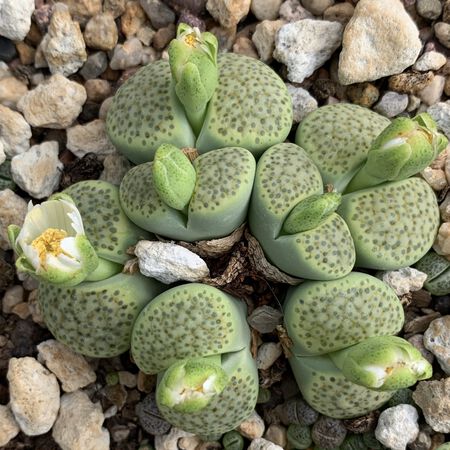Fulviceps, Lithops Seeds
Key Attributes
Living stone plants (Lithops species) are native to South Africa, where they grow among rocks. Fulviceps lithops are succulents with green skin tones. Living stones are small plants, often only 1/2" to 1" in diameter. Very little water is needed and oo much water can kill the plants. Yellow or white flowers appear towards the end of the growing season. Generally grown as houseplants.
Seed Germination: Sprinkle lithops seeds over the surface and cover with a fine layer of sand or vermiculite. Keep lightly moist. Germination should occur within 4-10 days.
Key Attributes
Product Details
Weight
0.008Depth
0.1Height
4.5Width
3.25Botanical Name
Fulviceps lithopsSeed Type
SeedPacket
15 SeedsSow Depth
1/4"Sun
Partial SunUses
HouseplantComponents
Growing Instructions
Shipping Schedule
Our Seed Promise
 "Agriculture and seeds" provide the basis upon which our lives depend. We must protect this foundation as a safe and genetically stable source for future generations. For the benefit of all farmers, gardeners and consumers who want an alternative, we pledge that we do not knowingly buy or sell genetically engineered seeds or plants.
"Agriculture and seeds" provide the basis upon which our lives depend. We must protect this foundation as a safe and genetically stable source for future generations. For the benefit of all farmers, gardeners and consumers who want an alternative, we pledge that we do not knowingly buy or sell genetically engineered seeds or plants.
The mechanical transfer of genetic material outside of natural reproductive methods and between genera, families or kingdoms, poses great biological risks as well as economic, political, and cultural threats. We feel that genetically engineered varieties have been insufficiently tested prior to public release. More research and testing is necessary to further assess the potential risks of genetically engineered seeds. Further, we wish to support agricultural progress that leads to healthier soils, to genetically diverse agricultural ecosystems, and ultimately to healthy people and communities.
To learn more about the "Safe Seed Pledge" please visit www.councilforresponsiblegenetics.org.

